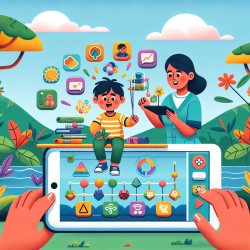The recent study titled "Functional capacity and assistance from the caregiver during daily activities in Brazilian children with cerebral palsy" offers valuable insights for practitioners in online therapy, particularly those working with children with cerebral palsy (CP). This research highlights the importance of understanding functional capacity and caregiver assistance needs, which can be critical for tailoring effective therapeutic interventions.
The study evaluated 20 Brazilian children with CP, using the Pediatric Evaluation Disability Inventory (PEDI) to assess their abilities in three dimensions: self-care, mobility, and social function. The findings revealed that the functional capacities were generally low across all dimensions, with social function showing slightly better performance compared to self-care and mobility. Specifically, the average scores were:
- Self-care: 27.4%
- Mobility: 25.8%
- Social function: 36.3%
In terms of caregiver assistance, the study reported the following average needs:
- Self-care: 9.7%
- Mobility: 14.1%
- Social function: 19.8%
For practitioners, these findings underscore the necessity of a comprehensive and individualized approach when designing therapy programs. Here are some actionable takeaways:
1. Assess Functional Capacity Regularly
Utilize tools like PEDI to evaluate the child's functional abilities and monitor progress over time. This can help in identifying specific areas that require more focused intervention.
2. Collaborate with Caregivers
Involve caregivers in the therapy process by educating them about the child’s abilities and how they can assist in daily activities. This collaboration can enhance the effectiveness of therapy and improve the child's overall quality of life.
3. Tailor Interventions to Individual Needs
Recognize that children with CP have varying levels of abilities and support needs. Customize therapy plans to address the unique challenges faced by each child, ensuring a holistic approach that includes physical, cognitive, and social aspects.
4. Encourage Multidisciplinary Involvement
Engage a team of professionals from different disciplines to provide comprehensive care. This can include physical therapists, occupational therapists, speech therapists, and special educators working together to create a well-rounded therapeutic program.
Implementing these strategies can significantly enhance the effectiveness of online therapy for children with CP, leading to better outcomes in their daily lives. Continuous research and adaptation of therapy practices based on empirical evidence are crucial for advancing the field.
To read the original research paper, please follow this link: Functional capacity and assistance from the caregiver during daily activities in Brazilian children with cerebral palsy.










